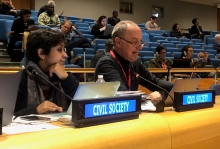"We require a strong and well-resourced public sector"

FFD Forum 18/04/2019 Panel D, Trade, science, technology, innovation and capacity building
David Boys, Speaking on behalf of CSO FFD group,
Major group workers and trade unions, Public Services International
Can the current trade regimes help people and planet?
We in labour are sceptical, as the trade regimes so far are designed by and for the biggest corporations and have led to the extreme concentration of capital and power that is causing so many problems across the globe.
Fewer than 30 individuals now personally own as much as half of all humans on this planet… how can that be? It is so outrageous as to be incomprehensible. Why are we failing so miserably in our duties to care?
This is due in part to our shrinking the role of government where it must only provide the enabling environment for global corporations and managers of global capital to do as they wish – deregulate, privatise and generally denigrate the government’s ability to do anything right.
Through the four days of this Forum, I have never heard speak of the value of civil service, of the pride and skills of public servants who deliver those services we depend on, the nurses and the teachers and all of the other civil servants who work in the shadows to provide the infrastructure and services we need. I only hear of entrepreneurs…
Instead we are facilitating the growing power of finance to take for itself the results of growing productivity and causing stagnant or decreasing wages.
We are failing due also to the systemic attack on labour, where wages and working conditions are reduced, as if a living wage is no longer deserved or even necessary. Where trade unions are attacked, and collective bargaining is denied by corporations, as both might shrink profits. And the increasing stigmatisation and suppression of dissenting opinions, banning NGOs and reducing the room for civil debates.
Labour advocates a rights-based approach which restores dignity to labour, to family and to community. Not a finance-based approach which reduces decisions to short-term profit maximisation and unbridled consumption.
Countries need to re-acquire the tools to set national industrial strategies that meet the needs and priorities of workers, families and communities. Finance, trade and global policy need to facilitate this process.
But there is a distortion, as today asset managers and rating agencies set our priorities. And trade regimes protect global investors. Where we are suggesting in the FFD process, through blending finance to provide even more public funds in the form of public risk guarantees in order to get the $200 trillion tucked away in private coffers to do what should be done anyway.
To help us down the road to a rights-based approach to sustainability, I suggest implementing the ILO’s Decent Work Agenda, which contains principles and proposals that should guide development policies, corporate policies, investment guidelines. Even as we see the nature of work evolve, the principles of Decent Work remain valid.
We require a strong and well-resourced public sector that can deliver on our needs for health and education, for clean water and clean energy, and much more.
We need regulation of new trade regimes of e-commerce, where, once again, the rules are set by the big companies for the big companies, who propose to control all the data of the planet.
Big tech is now trying to rewrite the trade rules to:
- Impose market access e.g., tele-education
- Deregulate as platform companies profit from not respecting local rules or paying local taxes
- Strip labour of its rights, as the gig economy defines workers as independent contractors
- Facilitate tax avoidance and evasion as a pillar of these virtual companies
- Control big data which is now the planet’s most valuable resource
- Block government access to source code disclosure of the algorithms that control ever-increasing parts of our lives
Is this the trade regime we need?
We need a regulated private sector, responsible towards the community where it makes profits and held accountable to pay fair taxes.
Government must be a responsible steward of the trust we vest in it to make policy and procurement decisions for peace, progress and planet, not for war and violence and massive inequality.
We encourage all delegates and all governments to keep their historical commitments firmly in mind as we move forward.
We stand ready to take our part in delivering the 2030 Agenda that meets the needs of people and planet.
Thank you.

